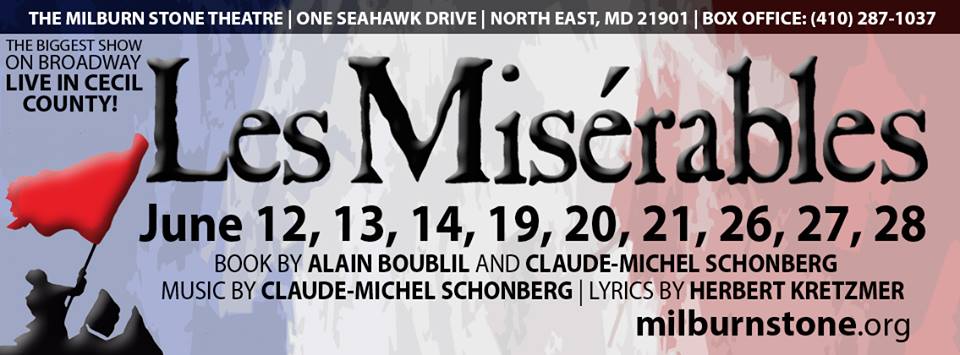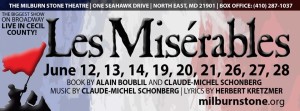When the beating of your heart echoes the beating of the drum, you know it’s time to see Les Miserables again, and this time, perhaps for the last time in the Baltimore-Philadelphia area for quite some time as the rights provided by MTI are being sealed away once more into the barricade of their vault. The Milburn Stone Theatre will be the last in a long line of the shows productions over the last two years when the rights were initially released for some time to come. Sitting down in a TheatreBloom exclusive interview, we discuss the principle protagonist and antagonist roles with the talented actors playing Jean Valjean and Javert.
If you could give us an introduction and an idea of what you’ve both been up to in the last year or so, we’ll get started!

Lee Lewis: I’m Lee Lewis and I’m playing Jean Valjean in this production of Les Miserables, I’m also the Artistic Director of the Milburn Stone Theatre. I haven’t been on stage in 16 years so this should be fun. It’s terrifying to be back on stage in a role such as this. I direct a lot. I just finished directing Follies, and after this closes I will be directing Merrily We Roll Along, and Company. We have a lot of Sondheim happening this season, Les Miserables was a surprise addition to the season but I’m really excited and the theatre is very fortunate to be able to squeeze it in.

Lance Bankerd: I’m Lance Bankerd and I’m playing Javert. I haven’t not been on stage in the past 28 years. Most recently I’ve done stuff at Milburn Stone a bunch, I just directed a production of The Beauty Queen of Leenane down at Spotlighters Theatre— Kat McKerrow for the win, she is made of win— but on stage? Let’s see…I was just Herod in Jesus Christ, Superstar at Oregon Ridge Dinner Theatre. Before that I was just here for their Addams Family as Uncle Fester and I did August: Osage County.
Lee: He was also my Simon Stryde when I did Jekyll and Hyde. Lance was terrifying as Simon. That cast was epic.
What was the draw to come out and do this show? I feel like that question sort of answers itself, who doesn’t want to do Les Mis? But it’s always interesting to hear the very specific reasons behind an actor’s choice to do so.
Lee: I think for me it was more of “If I’m going to come back to the stage and do a role, this is going to be it.” I don’t see myself coming back to the stage in 16 more years. I wasn’t originally going to audition. We had our first round of auditions and our show director, Marji Eldreth who is also the show’s musical director, turned to me and said “I think you should audition.” And I was like “Um, are you sure?” And she said, “Yeah, I think you’re my Jean Valjean.” And I was sort of like “Great, no pressure.” So I came in the next day and sang through a bunch of the songs with her the next day, and she said “Yep. You’re the guy.” So it really wasn’t a planned thing for me. It wasn’t something I was really chomping at the bit to do, but the more I’ve gotten into it, the more excited I’ve gotten over it.
It’s been a process for me because I haven’t done this in so long. You know, can I still do this? Can I still remember lines? That was one of the reasons I got out of acting because I was having trouble memorizing all the lines. So that’s been refreshing that I do remember most of it. I also didn’t know if I could physically do this because I was so out of shape. You know, between now and the last time you personally saw me, Amanda, I’ve lost 35 pounds, and yes it is specifically to make sure I don’t die doing this role. I started getting myself in shape and I’ve been lifting people. That’s my story.
Wait? People? Who else does Jean Valjean lift other than Marius?
Lee: Spoilers! But I pick up Fantine (Rebekah Latshaw.) She crawls out of her bed at the hospital and I physically pick her up and put her back. It’s a moment. I love it. You’ll see it when you come and see it. I also lift Marius (Abu Akki.)
Lance: And the cart.
Lee: Yeah, we had a whole pre-interview discussion about me lifting the cart. Mandy does not like the cart, so we’re moving on from the cart.
Lee is right there. Lance, why did you want to do this show?
Lance: I’m getting ready to move so this will be my last performance in the land of pleasant living. I’m moving to Florida. My wife and son are already down there. Javert was definitely what I was hoping for.
Lee: Thenardier.
Lance: Haha. No. Everyone thinks I’m Thenardier. I mean, I guess they think that because I piss in wine? But that’s really the only connection I see.
Lee: We are not doing that in this production.
Lance: No wine pee. No golden showers. Only little falls of rain. But seriously, I definitely wanted to go out with a bang. I think while Lee was reticent about doing Jean Valjean, I’ve always seen him as Jean Valjean so it’s nice to get to do this opposite him as my last show in the area.
You guys do work together frequently, what is it like getting to work together in this antagonistic, tension-bound pursuit and hate relationship?
Lee: Wait— it’s not a love story?
Lance: Oh, shoot. We thought it was a love story!
Lee: That would be Les Mis— exclamation point— The Musical.
Lance: I mean, logically you would think there would be some sort of carry through with their storylines given what the narrative tells us about their relationship, into what Lee and I are doing, but once it stops on stage we’re just laughing and having a great time. I think if anything it’s definitely brought us closer together and it’s been so much fun. It’s a relationship of mutual respect and admiration that allows us to stop and really figure out all the little nuances that make that on-stage tension and hatred and misunderstandings really work.
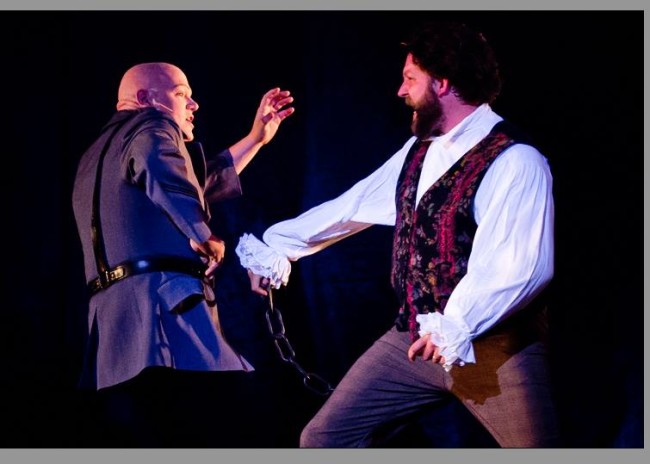
Lee: Actually, I think the most fun rehearsal I’ve had was when we were trying to figure out “The Confrontation.” It was just me, Lance, and Marji in a room trying to put it all together. The cool thing is that it was three directors working on a scene. I think that is what Marji would say made it work. It was the three of us just figuring it out, figuring out the mechanics of it, the intention behind it, and really making it work. All three of us bounced off of each other. It’s my favorite moment in the show.
Lance: I think that’s the fun of doing shows here in general, but this one in particular, because it’s the meeting of great minds. It just doesn’t feel burdened egotistically like it does in other places that you work. That helps the creative process, people are always open to discussing, talking, and figuring things out and consequently the result is a really nice organic production.
What is it that you are doing to sort of bring yourself to these very iconic and well-recognized characters? I know there was some pre-interview mention of not being “method.” But there has to be an element of self in a character otherwise it isn’t truthful on the stage.
Lee: Lance, you want to go first?
Lance: Yeah, sure. For a while in my life I was a devout person so I can understand that aspect of Javert. I think that’s really interesting, I’ve always been a student of religion. I think that that kind of fervent faith that when questioned— when something doesn’t reconcile with it— it’s totally impossible for him to continue on. That’s incredibly interesting as an actor to get to jump into something like that because I feel like anytime you’re dealing with something dogmatic you have the potential to go to the radical. I can see how he would go down that road. Also there’s something very interesting about his obsessive quality, his deep connection to what his view of justice is. That is something I’ve struggled with all of my life and I think that is why I get so obnoxious on Facebook and things like that.
Lee: You? Obnoxious? On Facebook?
Lance: I know, right? But I’m passionate about things that I see as unjust and when I feel that way I put it out there. Now, I’d like to think that I’m a little bit more informed than Javert, but that’s just because I have access to more knowledge than he did. When something is right and wrong— and you know, that’s the thing. Everybody says Javert is the antagonist, and they sympathize with Valjean, they say “All he did was steal some bread.” And for me, I say, “Really.” Because here’s my test and I think it’s the most beautiful part of the story, but if you can route for Valjean the entire time then you as an audience member should be able to look upon ANYONE who has ever broken the law, violated parole, become a fugitive, had to lie to get by, and not cast judgment. Anyone who has committed any of those things I just mentioned— just like Valjean— if he said he was sorry and he did his best, then you should be able to look at that individual who repented— and forgive them.
Anybody who used to be a drug addict, who stole cars, who killed somebody, if they repented like Valjean, and if you’re routing for Valjean— then you should be able to forgive them and let them move on like these people who so desperately wish Javert would just let Valjean move on. And that I think is the really intense part of this show. It really calls to question people’s standards of morality. You can fall in love with Jean Valjean and cheer him on, but what about the guy who comes up to you on the street “just got out of jail, can I have $5?” And the general response is “No! Get away from me!” But those same people? They think Jean Valjean is just swell.
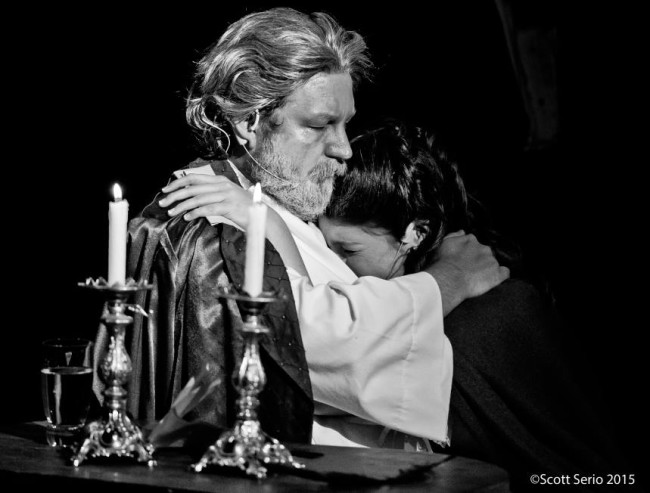
Lee: I think for me, this is two things. I’m really blessed and excited to do this show with Christy Wyatt, who is playing Cosette. Christy has kind of become my adopted little sister so the Valjean-Cosette relationship is very real for us. It’s been very fun and exciting and terribly difficult for us to do, but it’s very—
Lance: Potent.
Lee: Yes, potent. Thank you. That relationship really works well on stage. And I think that also for me I am kind of loyal to a fault with my friends. I can imagine that if it were me and I ran into Fantine in real life? That I found someone who I had wronged? I would do exactly what Valjean did. I would go to the ends of the earth and back and fight dragons if I had to. I really resonate with that and I just love that there is that connection because it gives me a lot to play with. My reasons aren’t quite as eloquent as Lance’s but those are my reasons.
Lance: I don’t know that it’s eloquence, what I do think— I think it’s passion. They’re both such passionate guys and we’re both such passionate guys. That’s why we get along. It happens to be that our interests collide, and obviously for Valjean and Javert they do not. But they are both undeniably passionate and obsessive.
Lance, we mentioned Javert as the antagonist, but often people label him as the villain. Do you see him as a villain?
Lance: People should route for Jean Valjean. I think that Hugo (novelist Victor Hugo) would say that they should because he could see the people for everyman to once be a criminal and then repent and reform. That doesn’t make Javert the villain, though. I mean we face these same problems here and now today, especially in Baltimore. Is it really the best idea to take a person who was hungry and punish them for breaking a window to steal some food? And then slap them with a breaking and entering charge, a larceny charge, put them in The Jessup and wonder why they come out crazy? I mean look at Valjean? Why did he spent 19 years imprisoned when he was only sentenced to five? Because that’s what prison does to you and that’s what Hugo— who worked in prisons— knew. What are we talking about? I don’t remember!
Whether or not Javert is the villain?
Lance: No! I don’t think he’s a villain.
Lee: You know, Valjean doesn’t think so either. He even says “You’ve done your duty and nothing more.”
Lance: Exactly. And that’s the first time that his world is upended. It just kills him because all this time he’s thought that Valjean hated him. He figured that Valjean would have killed him any chance he had, but when Valjean says that, the world changes for him. He’s not a villain, he’s just mistaken. He grew up in a prison. His duty is to the law. And I think his options were to either continue the gypsy lawless life that his parents were a part of or to seek education through the church and either enter the priesthood or the law. That was his salvation, his way out of darkness. He’s a hardcore Catholic. I think that informs him a lot. When he sees that his world view is incompatible with how the world actually is? He just removes himself from the world. He’s never going to be able to not chase Valjean. In a way it’s his gift to Valjean, taking his own life. He’s saying “you gave me my life? So it’s mine to give away. You can have freedom because I’m gone.” So no, he’s not a villain. He’s intense, sure, and I don’t think he’d be fun to hang out with.
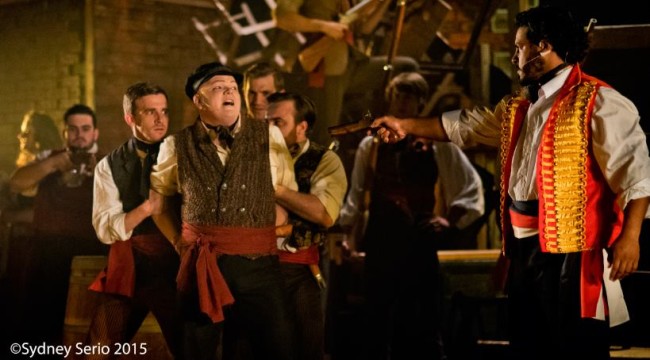
I do get inspiration from the book. Did you know that the only vice he had was that he would reward himself with snuff now and again? He had a sense of humor that was totally bizarre and odd. He was a little bit of a weirdo. I don’t think people really see that in him. He would laugh to himself about things he found funny. But people are used to that Terrance Man kind of stoic “the law” portrayal. You know “Me good you bad” sort of thing. But it’s not that at all. He’s a fun guy. There are lines in there that I don’t think people ever really play with his sense of humor in mind. Like he says “you must think me mad” when Valjean asks him for the three days. I mean this is a guy who understands that stuff can be funny.
Javert lives very much in the black and white world where it is either right or wrong and there is no middle ground whereas Valjean is in the perpetual gray. How does that sit with your functionality as an actor and a human being? Where does the gray fit in your life? Do you allow for the gray? Or are you much more aligned to the “there is a right and there is a wrong?” school of thought?
Lee: I think that I am actually a little more black and white than Valjean is, honestly. I definitely have strong views of right and wrong and people don’t always agree with those views but I still feel strongly about them. Now, I do understand the necessity for gray, I don’t know that I’m going to be breaking my parole anytime soon, like Valjean does. Or maybe that’s not true, as I’m saying this out loud I’m questioning myself here. If something happened that I felt as strongly about as he does for the situation that he was in, I would probably do whatever I needed to do to make that happen.
Lance: It is a hard question. How far would you be black and white to? Javert is pretty black and white up until the point where he’s dead. He never wavers.
Lee: I don’t know, that’s an interesting question that I really don’t know how to answer.
Musically this show is a beast. Let’s talk a little bit about the songs you guys get to sing.
Lance: It is a beast. Not just because operatic in nature, but it just requires a lot of musical skill. Thankfully we have Marji. She’s definitely insane but much to our benefit. Her musicality is out of control. It’s weird, because you’ve listened to this show for ages, with so many different versions and you’ve heard it so many times, but then you get to see the score with someone playing it for you during rehearsal as it’s written and you’re like “No, no, no, that doesn’t go like that.” And they’re like “Oh yes, yes it does.” It’s interesting because you have to negotiate the line between being a parrot for Philip Quast or doing your own thing while meeting Margie in the middle for what was written.
When you take a song like “Stars” which is terrifying just because it is so iconic, but thrilling because I’ve been singing it in my car since I first saw the production in DC at the Kennedy Center in 19— long time ago.
Lee: I think I was at that show as well.
Lance: You know I ate at the same restaurant that Valjean was at afterwards and I couldn’t bring myself to go up to him. My dad kept egging me on to go talk to him. We went toward the bathroom and my dad detoured me over and made me talk to him. I was crazy nervous. But it was worth it. Anytime you’re approaching a song like “Stars” you have to make it your own. And I think with Margie, she’s really given us the opportunity to sing through it and explore it. We’ve found where it’s important for the emotions to take over and where the musicality of it can sit within us with her.
What does “Stars” mean to you, Lance?
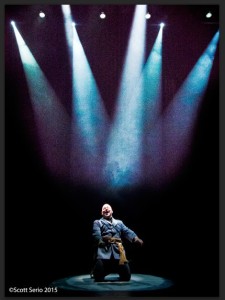
Lance: It’s the anthem of surety. That’s the beauty of that song, when you get it? It’s the song of surety. I’m a big fan of all things nautical so for me stars and celestial objects mean an awful lot. For me, the navigator symbols are what make it so special and personal and potent. At my father’s funeral we had them perform “Crossing the Bar” which is a great poem that again calls to navigation and using the stars for guidance. I think that that’s potent imagery for anyone, but especially for me. Once you can key into that it drives you. I feel like when I finally hit it right, and that happened once we finally got on full stage, I couldn’t help but turn my eyes heavenward. It’s compelling and I think that’s beautiful.
Lee, for you, I believe it’s “Bring Him Home.” Much like people judge Javert’s performance on “Stars” they judge Jean Valjean on that iconic number. What has that been like for you?
Lee: As I said to you, I think on Facebook the other day, you don’t want to go to The Phantom of the Opera and hear the Phantom fuck up “Music of the Night.” It’s very stressful taking on this number. It’s my most stressful moment in the show as a performer because it was a difficult song for me to learn. I really struggled, it was a mental block for me. I think that I have it now, but it’s still the moment where I’m like “here we are— here’s hoping I get through.” That’s what this whole show builds up to, because in that moment that’s where Jean Valjean lays it all on the table as to why he’s doing what he’s doing. So that’s why I’ve struggled a lot with that number. But also, just musically, I haven’t sang a show in 16 years. And I didn’t come back to sing in a show, I came back and I’m singing in Les Mis. I certainly haven’t sang a show with this much music for one actor in ever.
I mean every time that I’m off stage I have a flock of people dressing me and undressing me. There is no break. I’ve literally had to schedule in pee breaks. I’m drinking all that water to stay hydrated and keep my voice going— it’s crazy.
What would you say has been the biggest challenge taking on this show?
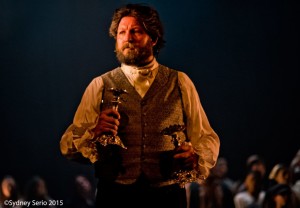
Lee: For me? Getting enough confidence to actually stand on that side of the proscenium again. Directing for me is a safe space. Nobody sees me. If I fuck it up, I can just go to the bar, I don’t have to be there in front of the people. It’s safe. It’s something I’m comfortable with, I’m confident, and I like it. With directing I get to be in total control. Control is a big thing for me. I have very little control in this show. We teched the other night and Marji said “Okay, you can go home.” And I was flabbergasted. I kept saying “But— but— the TD is staying so I have to stay.” And I didn’t understand that. It was sort of crazy. That has been the hardest thing, transitioning from having been a director, and stage manager, and designer for 16 years to literally being plopped right in the middle of a cast. You know “figure it out!” It’s like riding a bike, so they say. Which it is not! Lance Bankerd!
Lance: Haha! I know. I might told him that lie.
Lee: I was apparently riding a tricycle before.
Lance: I believe I told you it was like riding the devil’s bicycle.
Lee: So yeah, that’s for me. Lance?
Lance: I’m doing costumes for the show with Ryan DeVoe.
Lee: And they’re freaking amazing.
Lance: Fingers crossed! With the help of me mum, of course. Mama Bankerd! That’s been a hoot. But I love that chaos. I love living in that zone of many things at once. It’s fun for me. It’s a challenge that makes it fun. That’s what I’ve got, the only fun I have. A rewarding challenge. Nothing negative experiences. Oh— there is definitely— and I don’t normally have confidence issues— but when you’re doing such iconic music and everybody is staring at you thinking “why the hell did he get that role, it should have been me…” it’s a little unnerving.
Lee: Oh my god. Yes. Let me tell you. There is a lot of pressure, as the producing Artistic Director of this theatre, as the person who has looked at these people before and said “I’m sorry, you’re not good enough to be a certain part in a certain show.” and now I have all those people who are thinking “Hey, remember that time you didn’t cast me, or remember that time you only put me in the ensemble? Are you really going to be good enough for this?”
Wow. I don’t know how you’re not pulling your hair out over that.
Lance: He pulled out mine.
Lee: Ha! I do have many, many, many more gray hairs now because of it. It is very stressful. I know for a fact that there are going to be a faction of people who are coming to this show for the sole purpose of seeing me fail. And the goal is to prove them wrong. It’s added stress and added pressure, not that you don’t have enough when you’re playing Jean Valjean.
That is true. You are being compared to the greats, like Colm Wilkinson who originated the role, or Ramin Karimloo who is currently playing the role—
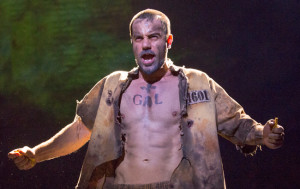
Lee: Okay, you can stop. So much more pressure. But here’s a fun Marji story. I told you I had made the decision that I had wanted to lose 50-ish pounds before doing this show. So I started eating healthier, I stopped drinking soda, I started working out and I started dropping the weight. Margie in an effort to push and push and push me, was sending me shirtless pictures of Ramin and tagging them with “you don’t look like this yet.” It drove me crazy! I’m never going to be Ramin! He’s a freak of nature! But that’s the type of director Marji is, she’s fantastic.
Lance: She’s fabulous!
That iconic line, “to love another person is to see the face of God” is where a lot of people sit this show in regards to defining the show as a whole. What does that line mean to you?
Lee: I know that that’s the line you’re supposed to like and that it’s supposed to define the show, but for me that’s not what it’s about. For me, the line that really is the definition of the show is “she’s the best of my life.” This all happens, everything in this show happens because he’s given this task to raise this child. He screwed up, he neglected somebody that he could have easily helped but was too much with the blinders on and in his own world. And he realizes that. So for me, that line is where this show lives. I try desperately to live my life for other people. “How can I be of service to you?” I’m a Rotarian. Service before self. If you want to really go back to it, Jean Valjean is the first Rotarian because he really did put others constantly before him. There’s this great quote where Cosette taught him more than he taught her. She was his prop and his staff and that to me is the important part. Not the “to love another person is to see the face of God.” Also, I’m an atheist. So that doesn’t resonate as much for me. He committed his entire life to make sure that this child will want for nothing. That’s what it’s all about.
Do you have kids, Lee?
Lee: No I don’t. Wait. Yes. I do. I have thousands of children. Like all directors.
Lance: I don’t think that line is the biggest takeaway I get because I’m dead by that point. I’m already backstage in my jeans. Just kidding, I want to stay in those pants as long as I can. They are great pants. I’m not an atheist. I’m a pantheistic, monist, non-dualist, non-essentialist egalitarian? So I think that it is a line that could resonate with me because I don’t think there is a personal God…you know for a pantheist the universe is the best thing we can say about god, so to love another person is to realize that we’re all connected and the things that separate us are cultural and silly tribalisms. I do think it has potential resonance. I don’t think most people are getting that out of it, though.
Is there a moment in the show that defines the show not necessarily for your characters but for you personally?
Lance: My crisis of conscious happens very quickly. It’s when I touch the wounded Marius and see Valjean over top of him, caring for him, and would literally open a vein to give him his life blood. That’s the moment where he goes “take him! Go before I can ruin this moment where I understand that you have to do this.” And of course, we keep Javert in the sewer, we don’t’ take him up. So he’s stuck there having that moment— and that for me it is the show. That’s right before he does himself in—
Did you just say you keep him in the sewer?
Lee: Mandy, you know we are not recreationists here at the Milburn Stone Theatre. You should know that by now. We are not doing your ma and pa’s Les Mis. I can kill Javert any damn well way I please.
Lance: You’ll see. Look, I remember being a kid and watching him fall off— no— not fall. Step. Step off of that bridge and roll around like a god damned fool on the floor as that thing flew above his head. And I was like “that guy just performed the fuck out of this whole show and he rolled around on the floor while they play water music?” No. Absolutely not. We wanted something dynamic.
Lee: Here’s what I will say about this production. Everything matters. There is not one thing that happens on this stage because it’s arbitrary. Everything matters. Every gesture I make, every hand-off of a prop, everything matters. It’s just showing the whole interconnected thing.
Lance: I was resistant to my suicide as we’re doing it when I first heard the idea. But once I did it, I couldn’t bring myself to do it any other way. It’s powerful. It’s scary and unnerving. Our tech director can’t watch it, he has to turn away.
Lee: That’s one of the things that Marji has been really good about. There is so much nuance in each and every character. And the relationships that we’ve built are just so freaking real and strong. There’s just nothing at all that is arbitrary. Wait— how did we get here? I know the question was not about Javert’s suicide…
Did you have a moment that defines the show for you personally?
Lee: I think the moment is during “The Bargain.” And this is something that Margie and I talked about at length. I’m not sure that Valjean had the intention of adopting Cosette when he left Fantine. “Your child will want for nothing. She’ll live within my care.” It doesn’t’ mean that he will take them from her and adopt her, it just means that he will provide for her and make sure that she is raised properly. That’s why I go with all the money. Why else would he take all the money with him? So I’m not convinced that it was his original intention. I think he sees this child and in her he sees all the things he’s missed out on from those 19 years in prison. He sees her knowing that he’s missed out on his sister’s son and that he’ll never see his sister’s son again. He’ll never get that chance, and when he sees how terrified she is to go back to these people he falls immediately in love with this child and that becomes his life goal. If you want to bring religion into it, that’s his mission straight from God. He is to raise this child and make sure that she is the best that she can be. That moment there when I look into little Amelia’s (Amelia Moss, Little Cosette) eyes, that’s the moment for me where she just has this sad look on her face, and I take that moment, “nope, game changer, this is what we’re doing now.”
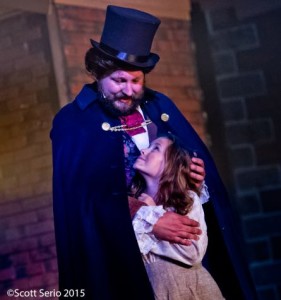
Lance: It’s funny that that is your moment. If you’d asked me what his moment was, before he just said all that, I would have said it’s that moment at the end with little Cosette where he grabs her and says “Come with me and come away” and she asks will there be castles and dolls and whatever she asks, and you grab her, sweep her up and tell her there will be anything she wants. That moment just really gets me. And defines him for me.
What has doing this show taught you about yourself as a performer? And about yourself as a human being?
Lee: It has taught me that acting is really fucking hard and that there’s reason that I haven’t done it in 16 years and that there’s a reason that I’m not going to do it for 16 more years. And that’s something that I think that directors forget. And I know I have been very guilty of that. I say to the actors all the time, “I don’t understand what the problem is, I’m telling you what to do, just fucking do it.” But being on this side of it has made me realize that you can’t always just do what they’re telling you to. What they’re asking you to do in some cases is physically impossible. We forget that as directors, a lot. Acting is hard. It is not simple. When an actor says that they can’t do something it doesn’t mean that they’re just being a diva or persnickety, they might actually not be able to do it. There are some things that Margie has asked me to do that just aren’t going to happen. I will try my damnedest but it’s just not going to happen. Marji has been super great about it. It’s a great reminder of why I stopped acting.
Sort of going on what Lance was saying, just because somebody does something illegal doesn’t necessarily mean they’re in the wrong. I mean all Jean Valjean was trying to do was feed his family. That’s all he was trying to do. Lance and I kind of have the opposite feelings about that, but we as a society judge people far too quickly. You don’t know what they have to go home to, you don’t know what their life has been. It’s a nice reminder, this show, that we shouldn’t be so quick to judge because you never know, these criminals might just be Jean Valjean.
Lance: What was the question? As an actor and as a person it’s supposed to have taught me something? Okay, as an actor it’s a great technical show. It teaches you a lot of technique and the necessity for it. It is an aerobic exercise. It teaches you the need for certain physical limitations and how to overcome those. It’s also a hard role because it’s one of those Captain Von Trapp roles. Everyone thinks that Captain Von Trapp is an easy role to play. Captain Van Trapp is an extremely hard role to play. You think it’d be easy to play “the baddie” who is chasing Jean Valjean and chasing him the whole time, but it’s not. If you play that— that’s not even one dimensional, that’s no dimensional. And it’s not interesting at all. You have to find nuance. I also find that because of the operatic nature of the show, that I get to play in a realm that I never get to play in. Oregon Ridge is so small, Spotlighters is a tiny place. A lot of places push for realism. But the great thing about musical theatre genre and this work in particular because it’s so operatic in nature that we’re elevated from the natural world. That’s a fun space to play in.
As a person it’s been really hard because my wife and son are in Florida. They moved months ago. This entire audition through the rehearsal process I’ve done without my normal support system at home. Yes, my wife is flying up to see closing weekend. My son won’t come up to see because he refuses to see it unless he can play Gavroche. He’s only three. This show has taught me resilience in myself. That’s helped to feed into the stoic loneliness of the character. I’m living a monastic life. The only time I ever go out is when the cast goes to Steak and Maine. It’s been incredible to devote myself to this show.
What is it that you are hoping people will take away from seeing the Milburn Stone production of Les Mis?
Lance: Merchandise?
Lee: Don’t tease her. She loves show merch. There is no show merch for this show.
Lance: My secret hope is that people will take Lee’s sentiment. Don’t’ be a judgy budge. Don’t be a dick, like Buddha said. Also, I think this is the climate for this show. This is a great climate for seeing youth on stage who are so done with— what they see as government— with the way that the government is treating people. The poor, the miserable, the wretches, being abused by the government, we still have all that and seeing the youth wanting to change that. That’s what is so great about Hugo, he was a giver. He was a Rotarian.
Lee: I think for me— and this is the producer speaking, not necessarily Lee the actor— but I’m really proud of this cast. They are so freaking talented. We are this little theatre in the middle of Cecil County Maryland. We shouldn’t exist. I think we do some of the best theatre around if not the best theatre around. I just hope that people see that and we make it worth their $18.
Thank you for answering the next question, which is why should people come and see this show, Lance, if you’d like to add onto that…
Lance: Why? Why? Because you’re going to have a fantastic time. You’re going to laugh, you’re going to cry, and you’re going to want to stage a revolution.
Can we get a little of “The Confrontation?”
Lance: What do you mean?
Lee: Oh my God. NO!
Lance: Oh you mean like those interviews with Neil Patrick Harris and Jason Segel? Where they just start singing the confrontation?
Lee: No. No. NO!
Lance: I’ve seen those interviews— and that’s exactly why we will not being doing that right here and right now because it’s always—
Lee: Terrible! It’s always terrible! You want to hear us sing “The Confrontation?” Come see the show!
Lance: That’s right. See the show if you want to hear these people sing.
Les Miserables plays through June 28, 2015 at The Milburn Stone Theatre— 1 Seahawk Drive in North East, MD. For tickets call the box office at 410-287-1037 or purchase them online.

